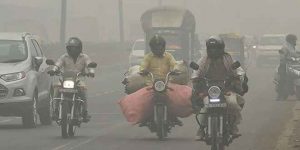Air Quality Life Index : Report

The recently released Air Quality Life Index (AQLI) report suggests that air pollution shortens the lives of the residents of Delhi by around 11.9 years.
Highlights of the report:-
- On account of the number of people that high particulate matter levels affect in India, the country faces the greatest health burden from air pollution among all the countries in the world.
- In South Asia, particulate pollution has increased by 9.7 percent from 2013 to 2021.
- In India, 5 levels rose 9.5 percent.
- Particulate matter( PM): particles found in the air, including dust, dirt, soot, smoke, and liquid droplets that remain suspended in the air for long periods of time.
- According to PM2.5 data for 2021 derived from satellites, pollution in India has increased from 56.2 µg/m3 in 2020 to 58.7 µg/m3 in 2021.
- This is more than 10 times the WHO guideline of 5 µg/m3.
- Delhi’s annual average PM2.5 level in 2021 was found to be 126.5 µg/m3, which is more than 25 times the World Health Organization (WHO) ( Delhi and Air Pollution)
- The report said particulate matter pollution is also the biggest threat to human health in India in terms of lowering life expectancy, beating cardiovascular diseases, and child and maternal malnutrition.
- The average Indian resident is set to lose 5.3 years of life expectancy if the WHO guideline is not met.
Air Quality Life Index (AQLI):-
- Produced by: Energy Policy Institute at the University of Chicago (EPIC).
- Published: Annually.
- The Air Quality Life Index ( AQLI), provides details of impact of air pollution on life expectancy.




